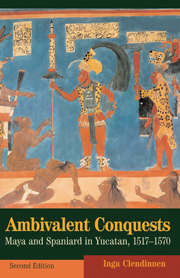Book contents
- Frontmatter
- Contents
- List of illustrations
- Preface to the second edition
- Preface to the first edition
- Acknowledgments
- Map I Yucatan in the conquest period
- Part I Spaniards
- 1 Explorers
- 2 Conquerors
- 3 Settlers
- 4 Missionaries
- 5 Conflict
- 6 Crisis
- 7 Attrition
- 8 Retrospections
- Epilogue: The hall of mirrors
- Part II Indians
- Epilogue: Confusion of tongues
- Appendix: A sampler of documents
- Glossary of Spanish and Maya terms
- Notes
- Select bibliography
- Index
7 - Attrition
Published online by Cambridge University Press: 05 October 2013
- Frontmatter
- Contents
- List of illustrations
- Preface to the second edition
- Preface to the first edition
- Acknowledgments
- Map I Yucatan in the conquest period
- Part I Spaniards
- 1 Explorers
- 2 Conquerors
- 3 Settlers
- 4 Missionaries
- 5 Conflict
- 6 Crisis
- 7 Attrition
- 8 Retrospections
- Epilogue: The hall of mirrors
- Part II Indians
- Epilogue: Confusion of tongues
- Appendix: A sampler of documents
- Glossary of Spanish and Maya terms
- Notes
- Select bibliography
- Index
Summary
No report survives of the first meeting between the bishop and the Provincial. It must have had some of the quality of a tidal wave meeting a rocky coast. Toral, entering a situation charged with malice and close to hysteria, was determined to slow the onward plunge of events by introducing the bridle of legal process. That determination must have indicated to Landa the bishop's essential identification with the settlers' reading of events. Having examined the Sotuta confessions Toral confirmed Landa and his friars in their inquisitorial authority. But he absolutely prohibited any further use of torture.
The prohibition implies a degree of scepticism, even at that very early date, as to the veracity of the Sotuta confessions. Clearly the reckless use of torture could not be permitted, but under proper regulation it was a permitted instrument in the inquisitorial armoury. Toral might have hesitated to authorise its employment against neophyte Indians fallen back into idolatry, but deliberate acts of blasphemous human sacrifice would have required the sternest measures. It would seem that Toral had made an early judgment not so much from the content of the confessions, which were compelling enough, but on the man who had secured them. His prohibition, despite Landa's furious protests, remained absolute. Landa and his friars for their part refused to participate any further in the enquiry.
There began a long contest between the two men, reminiscent in its wary intensity of the Hernandez affair; although here the players were more evenly matched. Within a fortnight they communicated only through notaries.
- Type
- Chapter
- Information
- Ambivalent ConquestsMaya and Spaniard in Yucatan, 1517–1570, pp. 93 - 111Publisher: Cambridge University PressPrint publication year: 2003

